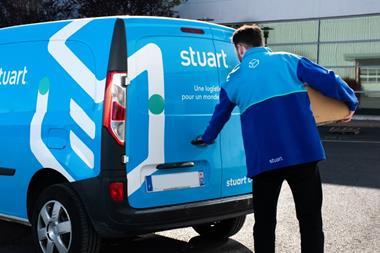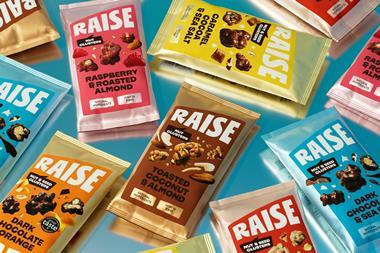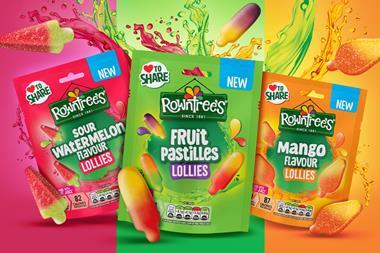Worth well over £481m and growing at a flighty 25% year on year, it’s clear to see why the energy sector is seen as such an exciting opportunity within the UK soft drinks market.
Today’s hectic lifestyles are fuelling the market, and figures from Britvic’s latest Soft Drinks Report suggest that 31% of Brits now purchase a glucose or stimulant drink at least once a year.
In the past six months, players both large and small have been busy launching new products to lure even larger numbers of consumers into this lucrative category. April saw the launch of Lucozade Alert, the new 250ml tipple from the makers of best-selling Lucozade Energy. The drink is designed to give mental as opposed to physical stimulation and was developed in conjunction with office workers to help combat energy lulls at work. Also fresh from the NPD kitchen this year is Boost’s 500ml cranberry energy drink variant. The new flavour and low-calorie content is proving to be a hit with health-conscious consumers who are looking for something different in the energy drinks sector.
Boost managing director Simon Gray explains: “Consumer demand for additional ranges and flavours is exceptionally high and original energy drink flavours aren’t enough anymore. The Boost range includes a light version of our original energy drink flavour, but also offers a low-calorie cranberry version to benefit from the fashionable following which cranberry enjoys.”
Gray predicts that the trend towards more interesting juice flavours will continue to shape the energy drinks segment in the years to come. Flavour has also been front of mind for the team at Coca-Cola Enterprises, which added Relentless Juiced to its portfolio earlier this year. The drink, with a 50% juice content, is designed to complement its Relentless Inferno energy drink which was launched last August.
And despite some negative press coverage over children’s consumption earlier this year, Red Bull Energy remains one of the highest flyers in the sub-category. Sales grew by a massive 23% to £170m in the past year according to the Britvic Soft Drinks Report, and 2008 is shaping up to be one of the biggest and busiest years for the brand which has earmarked a massive £28m for marketing.
Unlike many of the other soft drink sub categories, such as water and cordials, energy drinks do not rely on the weather to drive sales. “Energy drinks are much more occasion driven,” explains Red Bull head of off trade Matt Hollier. The Red Bull team reckons that sales will reach a sky-high 36 million cans this year as a result of the Red Bull Air Race on August 2 and 3.
So how are energy drinks expected to perform in the second half of this year and beyond? Well, all parties agree that the category still has huge growth potential. Barr Soft Drinks head of marketing Adrian Troy explains: “Penetration of energy drinks in the UK is only 20%, whereas it’s as high as 50% in some other countries.”
AG Barr’s new Rockstar energy drink has had a storming start with just over five million cans sold since its launch in November 2007. The brand, which offers three fruity flavoured 500ml cans, has sponsored a range of high-octane events including drift car racing, freestyle motorcross and boxing. Price is also expected to play an increasingly important role in the market, given the current state of the economy and shrinking budgets.
Boost’s Gray says: “Consumers want a quality product in attractive packaging, but they do not want this to affect the price. This should be kept as low as possible to appeal to a broad section of customers.” Brands such as Boost, which has a rrp of 55p for its 250ml can; popular energy drink V, which is now available in a 99p pricemarked pack; and Booker’s Euroshopper energy drink will be looking to profit from any shifts in consumer buying behaviour. Health and wellbeing will also continue to shape the sector, resulting in more natural and lower-calorie variants.
Sporting Success
No longer the exclusive preserve of professional athletes, sales of sports drinks are flying thanks to regular consumers looking to keep fit and lead more active lifestyles. The category is currently worth £154m and growing at 16%. And brands large and small are responding to this heightened consumer interest in sport and health with a swathe of new product innovations and high-profile advertising campaigns.
Responding to consumers’ increasing preference for more natural products, the UK became the first global market to launch a new formulation of Gatorade earlier this year. The drink, which Britvic claims is the number one best-selling sports drink in the world with a 48% global market share, contains no artificial colours, flavours or sweeteners and no preservatives. It is available in orange and lemon variants.
With consumers becoming increasingly ingredient savvy, ads for the brand have been designed to highlight its scientific heritage. Lucozade Sport is also benefiting from increased demand thanks to the current advertising campaign to drive awareness of its full sports range, which includes Lucozade Hydro Active and Lucozade Sport with Caffeine Boost.
Lucozade Sport group brand manager Adam Prentice says: “We know that a good many sport and exercise participants are unaware of the full range of Lucozade Sport products and the performance benefits they bring. Indeed, 47% of sports and exercise participants have never tried a sports drink. By driving education and awareness we can tap into this opportunity and successfully grow the sports and exercise drinks category.”
The Powerade brand was also given a boost following the launch of Powerade Orange and a ‘Try Me Free’ £1.5m marketing campaign in May.
Today’s hectic lifestyles are fuelling the market, and figures from Britvic’s latest Soft Drinks Report suggest that 31% of Brits now purchase a glucose or stimulant drink at least once a year.
In the past six months, players both large and small have been busy launching new products to lure even larger numbers of consumers into this lucrative category. April saw the launch of Lucozade Alert, the new 250ml tipple from the makers of best-selling Lucozade Energy. The drink is designed to give mental as opposed to physical stimulation and was developed in conjunction with office workers to help combat energy lulls at work. Also fresh from the NPD kitchen this year is Boost’s 500ml cranberry energy drink variant. The new flavour and low-calorie content is proving to be a hit with health-conscious consumers who are looking for something different in the energy drinks sector.
Boost managing director Simon Gray explains: “Consumer demand for additional ranges and flavours is exceptionally high and original energy drink flavours aren’t enough anymore. The Boost range includes a light version of our original energy drink flavour, but also offers a low-calorie cranberry version to benefit from the fashionable following which cranberry enjoys.”
Gray predicts that the trend towards more interesting juice flavours will continue to shape the energy drinks segment in the years to come. Flavour has also been front of mind for the team at Coca-Cola Enterprises, which added Relentless Juiced to its portfolio earlier this year. The drink, with a 50% juice content, is designed to complement its Relentless Inferno energy drink which was launched last August.
And despite some negative press coverage over children’s consumption earlier this year, Red Bull Energy remains one of the highest flyers in the sub-category. Sales grew by a massive 23% to £170m in the past year according to the Britvic Soft Drinks Report, and 2008 is shaping up to be one of the biggest and busiest years for the brand which has earmarked a massive £28m for marketing.
Unlike many of the other soft drink sub categories, such as water and cordials, energy drinks do not rely on the weather to drive sales. “Energy drinks are much more occasion driven,” explains Red Bull head of off trade Matt Hollier. The Red Bull team reckons that sales will reach a sky-high 36 million cans this year as a result of the Red Bull Air Race on August 2 and 3.
So how are energy drinks expected to perform in the second half of this year and beyond? Well, all parties agree that the category still has huge growth potential. Barr Soft Drinks head of marketing Adrian Troy explains: “Penetration of energy drinks in the UK is only 20%, whereas it’s as high as 50% in some other countries.”
AG Barr’s new Rockstar energy drink has had a storming start with just over five million cans sold since its launch in November 2007. The brand, which offers three fruity flavoured 500ml cans, has sponsored a range of high-octane events including drift car racing, freestyle motorcross and boxing. Price is also expected to play an increasingly important role in the market, given the current state of the economy and shrinking budgets.
Boost’s Gray says: “Consumers want a quality product in attractive packaging, but they do not want this to affect the price. This should be kept as low as possible to appeal to a broad section of customers.” Brands such as Boost, which has a rrp of 55p for its 250ml can; popular energy drink V, which is now available in a 99p pricemarked pack; and Booker’s Euroshopper energy drink will be looking to profit from any shifts in consumer buying behaviour. Health and wellbeing will also continue to shape the sector, resulting in more natural and lower-calorie variants.
Sporting Success
No longer the exclusive preserve of professional athletes, sales of sports drinks are flying thanks to regular consumers looking to keep fit and lead more active lifestyles. The category is currently worth £154m and growing at 16%. And brands large and small are responding to this heightened consumer interest in sport and health with a swathe of new product innovations and high-profile advertising campaigns.
Responding to consumers’ increasing preference for more natural products, the UK became the first global market to launch a new formulation of Gatorade earlier this year. The drink, which Britvic claims is the number one best-selling sports drink in the world with a 48% global market share, contains no artificial colours, flavours or sweeteners and no preservatives. It is available in orange and lemon variants.
With consumers becoming increasingly ingredient savvy, ads for the brand have been designed to highlight its scientific heritage. Lucozade Sport is also benefiting from increased demand thanks to the current advertising campaign to drive awareness of its full sports range, which includes Lucozade Hydro Active and Lucozade Sport with Caffeine Boost.
Lucozade Sport group brand manager Adam Prentice says: “We know that a good many sport and exercise participants are unaware of the full range of Lucozade Sport products and the performance benefits they bring. Indeed, 47% of sports and exercise participants have never tried a sports drink. By driving education and awareness we can tap into this opportunity and successfully grow the sports and exercise drinks category.”
The Powerade brand was also given a boost following the launch of Powerade Orange and a ‘Try Me Free’ £1.5m marketing campaign in May.
Red Bull’s
tips for staying
energised
● Go to bed and get up at the same time every day. This routine, once established, will ensure you feel wide awake when you are awake and sleepy when it’s time to go to bed ● Allow a wind down period of at least 40 minutes before turning in. This will help trigger a desire for sleep once your head hits the pillow ● Avoid a diet rich in carbohydrates, such as bread, rice, potatoes and pasta. These foods can leave you feeling sluggish ● The same goes for snacks high in carbohydrates and sugar. You don’t have to eliminate these entirely, but nibble on them sparingly and combine enjoyable treats with healthier, fibre-rich foods ● Worry is an energy sapping misuse of the imagination. Get concerns out of your head by writing them down ● Breathe your way to greater energy by sitting up straight to ensure the air flows easily into your lungs, then take six deep breaths ● Take every opportunity to get out in the natural light, especially on sunny days. Light helps reset your body clock and so provides an energy boost.
● Go to bed and get up at the same time every day. This routine, once established, will ensure you feel wide awake when you are awake and sleepy when it’s time to go to bed ● Allow a wind down period of at least 40 minutes before turning in. This will help trigger a desire for sleep once your head hits the pillow ● Avoid a diet rich in carbohydrates, such as bread, rice, potatoes and pasta. These foods can leave you feeling sluggish ● The same goes for snacks high in carbohydrates and sugar. You don’t have to eliminate these entirely, but nibble on them sparingly and combine enjoyable treats with healthier, fibre-rich foods ● Worry is an energy sapping misuse of the imagination. Get concerns out of your head by writing them down ● Breathe your way to greater energy by sitting up straight to ensure the air flows easily into your lungs, then take six deep breaths ● Take every opportunity to get out in the natural light, especially on sunny days. Light helps reset your body clock and so provides an energy boost.
Life in the fast lane
Working in retail is “as mentally draining as being a barrister and as physically demanding as being an athlete” a study by Red Bull Energy has revealed. The research reveals that more than half (54%) of retailers are exhausted at the end of a shift. The results also highlighted that as many as 10% of workers feel their energy levels start to flag just two hours into their shift. More than a third (35%) of employees were on duty for 10 hours or more a day, while a further 13% worked shifts lasting more than 13 hours. The study, which involved skin conductance tests and a special type of camera used to measure and record energy levels, was carried out on a range of different retailers. It found that independent c-store retailers put in the most hours, while the shortest are enjoyed by forecourt retailers, where 77% work shifts of less than nine hours. Long hours are compounded by the fact that two-thirds of retailers take only two short rest breaks at most during their shifts. However, even brief breaks would seem a luxury to the 11% of retailers who reported that they never take a break. Almost half (45%) of those questioned agreed that declining energy levels affected their work. Some 57% said it made them irritable with customers and colleagues, while 24% said it decreased their job satisfaction. Some 5% of retailers said that to pep themselves up they took a power nap during their shift, while 37% said that they relied on an energy drink. Dr David Lewis, who carried out the study, said: “It shows how demanding being a retailer can be. They need boundless energy to deal difficult customers. They are on their feet all day and they rarely get a break.”
Working in retail is “as mentally draining as being a barrister and as physically demanding as being an athlete” a study by Red Bull Energy has revealed. The research reveals that more than half (54%) of retailers are exhausted at the end of a shift. The results also highlighted that as many as 10% of workers feel their energy levels start to flag just two hours into their shift. More than a third (35%) of employees were on duty for 10 hours or more a day, while a further 13% worked shifts lasting more than 13 hours. The study, which involved skin conductance tests and a special type of camera used to measure and record energy levels, was carried out on a range of different retailers. It found that independent c-store retailers put in the most hours, while the shortest are enjoyed by forecourt retailers, where 77% work shifts of less than nine hours. Long hours are compounded by the fact that two-thirds of retailers take only two short rest breaks at most during their shifts. However, even brief breaks would seem a luxury to the 11% of retailers who reported that they never take a break. Almost half (45%) of those questioned agreed that declining energy levels affected their work. Some 57% said it made them irritable with customers and colleagues, while 24% said it decreased their job satisfaction. Some 5% of retailers said that to pep themselves up they took a power nap during their shift, while 37% said that they relied on an energy drink. Dr David Lewis, who carried out the study, said: “It shows how demanding being a retailer can be. They need boundless energy to deal difficult customers. They are on their feet all day and they rarely get a break.”






























No comments yet